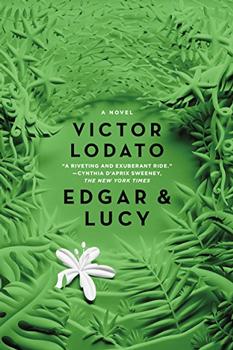Summary | Excerpt | Reading Guide | Reviews | Beyond the Book | Readalikes | Genres & Themes | Author Bio

* * *
Lucy knew. Sometimes she'd hear the boy gasp, coming out of one of his dreams. She'd hear his bed creak as he got up to find comfort, not with her. She didn't mind the boy's choice. She had enough trouble sleeping as it was. The old woman slept like a stone. Not that Lucy would ever prevent the boy from climbing into her bed. She would accept her duty, gladly, should Edgar ever call her to it. But he spent more time with the old woman; certain tracks got laid, certain habits. Was Lucy jealous? No. No. She didn't mind the physical fact of Edgar's choice, but sometimes she just didn't care for the idea of it. There were nights, of course, when she craved a body next to her. Yet, even then, she knew the boy wouldn't be enough to ease her loneliness. He might make it worse, his skinny sleeping body instinctively burrowing into hers for warmth. What room did she have for such innocence? The bodies she craved tended toward violence.
* * *
Edgar eased himself off his grandmother's bed and went straight for the bottle. He had permission, didn't he? He touched it (still cold); he lifted it and pressed it to his cheek. The ghost of a scent lingered on the glass. When he removed the stopper and pointed his nose toward the opening, he knew to close his eyes. Powder and flowers and spice—and now sweet grass, sweet sweat. He tilted the bottle and wet his finger, quickly carrying the precious fluid to the taut skin just behind his right ear, then behind his left, as he'd seen women do on television. The liquid tingled, a subtle electrification, as the scent changed, bloomed, became an extension of the boy himself. It was Edgar; Edgar electrified by flowers. The charge was exhilarating, and he could feel the rush of his blood. He stole some more, just a bit, and swiped it across the front of his neck.
Time stopped, as it rarely does. The boy breathed, unnoticed by life or death. Breathed himself into himself. It was as if there were two of him, and each kissed the other, agreeing on something. Exactly what, neither could say. They could only say: yes, this. This.
* * *
He stood in the hallway. Eight years old, sleepy—someone should have sent him to bed. He looked toward his room, and sent himself.
But wait. A burble of laughter. Or was it an owl? Edgar leaned against the wall, listening. The sound was coming from downstairs. He moved toward the banister. The owl was his mother.
But the sound was wrong. His mother's real laugh was something else, flames shooting from a ten-story building. Nothing could put it out but the fire itself. And if you stood too close, you were doomed. It was a leaping, contagious cackle. But downstairs, now, it sounded like a doll's laugh. High-pitched but breathy, like a paper horn, spiking at intervals, steady and mechanical. Maybe it wasn't his mother. As he walked down the stairs, he wondered if he was in the right house. Sleepiness was doing funny things to the pictures on the walls. Where there should have been a painting of a sailboat, there was now a painting of a huge sunlit cleaver emerging from the sea. At the bottom of the stairs, he caught a glimpse of his grandmother's black piano, an impeccably polished upright that seemed to have gained some weight since last he saw it. He regarded it as if for the first time—the keys like loose teeth, bright whites and rotting blacks that could fall out at any moment. Maybe that's why no one played it anymore. Someone, he noticed, had turned down a few of the framed photographs that rested on top.
And the boy could smell cigarettes, and cigarettes weren't allowed in the house. After the old man had died, Florence had said, enough (her exact words were "I'm done with that stink."). His mother was supposed to smoke on the porch.
Excerpted from Edgar and Lucy by Victor Lodato. Copyright © 2017 by Victor Lodato. Excerpted by permission of St. Martin's Press. All rights reserved. No part of this excerpt may be reproduced or reprinted without permission in writing from the publisher.
Your guide toexceptional books
BookBrowse seeks out and recommends the best in contemporary fiction and nonfiction—books that not only engage and entertain but also deepen our understanding of ourselves and the world around us.